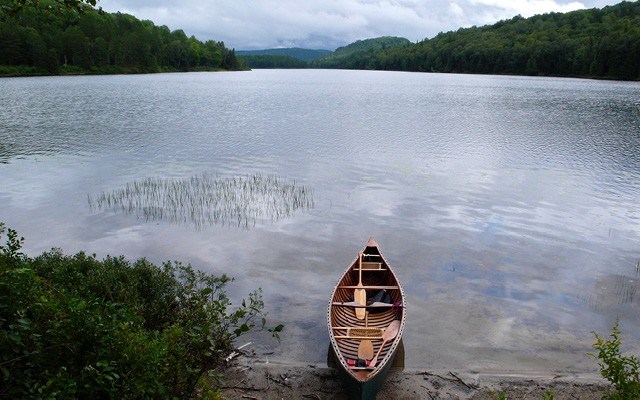It kills you to see them grow up. But I guess it would kill you quicker if they didn't.
—Barbara Kingsolver, Animal Dreams
He watched the canoe he'd just tossed on the water, thinking about how perfectly it was designed, noting how differently it floated when empty, and remembering what a pain in the ass it was to fill. No matter: after today there would be no more of that. And at the far end of the lake, a mere day's paddle away, was the journey's true terminus. Where the boats would be raised from dark, boreal waters for good, and silently thankful parents would crowd and beam and embrace smoke-saturated kids who suddenly felt too much like adults to be hugged that hard, answering eager questions like, "How was it" with dismissive enthusiasms like, "Awesome — of course," eschewing any elaboration because it was impossibly soon to allow anyone else into the sanctum of such an intense, shared experience. Theirs was the insulating sphere of teen camaraderie; a first experiment in true friendship.
Beyond the lake and its serrated horizons lay more than a return to home and school. There was also a future lurking in these very moments. Nothing the boy could know or even imagine. A university degree. Travel. A repeat of that cycle, and then the same again, in a strange triptych that would end — oddly, some opined, after such heavy investment — in a swerve away from academia. Another career would assemble, a marriage would do the opposite, but not before a daughter appeared, bright and intense and ever-questioning, that he would love more than he could ever have fathomed. Who would love back equally and with a trust he found disquieting, growing to be more like him than either would be comfortable with, yet something they would, ultimately, find mutually amusing, drawing them closer still.
The presence of this creature in his life would answer enough of those burning raison d'être questions that, finally comfortable with his existence, he would stop asking.
But that was all a distant mirror, dozens of orbits around the sun to come, and standing in the water of the big lake that afternoon, bronzed but uncertain hands holding light to the gunwale of a floating canoe, he remained but an unknowing youth; manhood existed only in the fleeting self-sufficiency he'd experienced over the past month, and his momentary concern over the meaning of this, now trying to weave itself into consciousness, would evaporate when the first of his friends broke from the woods. Introspection was not yet his forte. Smart-ass was his badge. And he would, for now, happily abandon any lump-throated confusion to a flush of fist-pumping adolescent victory and joke-making, quite naturally ignoring the question of what exactly this was.
He would, however, find himself pondering that particular scene on occasion over the years, during the quieter interstices of a runaway life, returning to the smells, the sights, the sounds, the feelings of that day as a semaphore for subsequent experiences of wilderness immersion — though it was never quite clear what burned behind the wan smile these thoughts usually traced. He would, when time permitted — and most often while sitting by a lake — variously plumb this crucible of nature, passage, education, challenge, love, and belonging for connections, landing up most often at the notion of his very identity as a Canadian male.
Eventually, over time, he would come to realize that he had to stand again in those numinous waters, perhaps in that very place, to know for certain. To find this lapsed being he thought he knew, hoping there would someday be reason and impetus to do so, and never imagining that when the opportunity finally arose, in the crisis-cum-doldrums of middle age, that this reverent homunculus so long gestated, fed for decades on an umbilical drip of glory-day dreams, would be born as mere embarrassing nostalgia by the first words he'd hear.
"Dad, that portage sucked," announced his now 16-year-old daughter, the one he'd talked into spending two weeks of her oh-so-short summer retracing the month-long canoe trip he felt had defined him at her same age. "I'm so glad it's the last one. Where's the chocolate?"
You could go back, it seemed, but you could never really go back. You could, however, also see, reflected in the casualness of another, how those things conceived in retrospect to be of such import might not have felt that way at the time. But you could always take comfort in the transformative power of time to change them, imagining a moment like this as an inchoate seed, planted in a young mind on the shore of a distant lake, to be transported through life and grown into a cherished memory. And that would be enough to justify it all.
For Part I of this series go to www.piquenewsmagazine.com June 29, 2016.
Leslie Anthony is a Whistler-based author, editor, biologist and bon vivant who has never met a mountain he didn't like.




